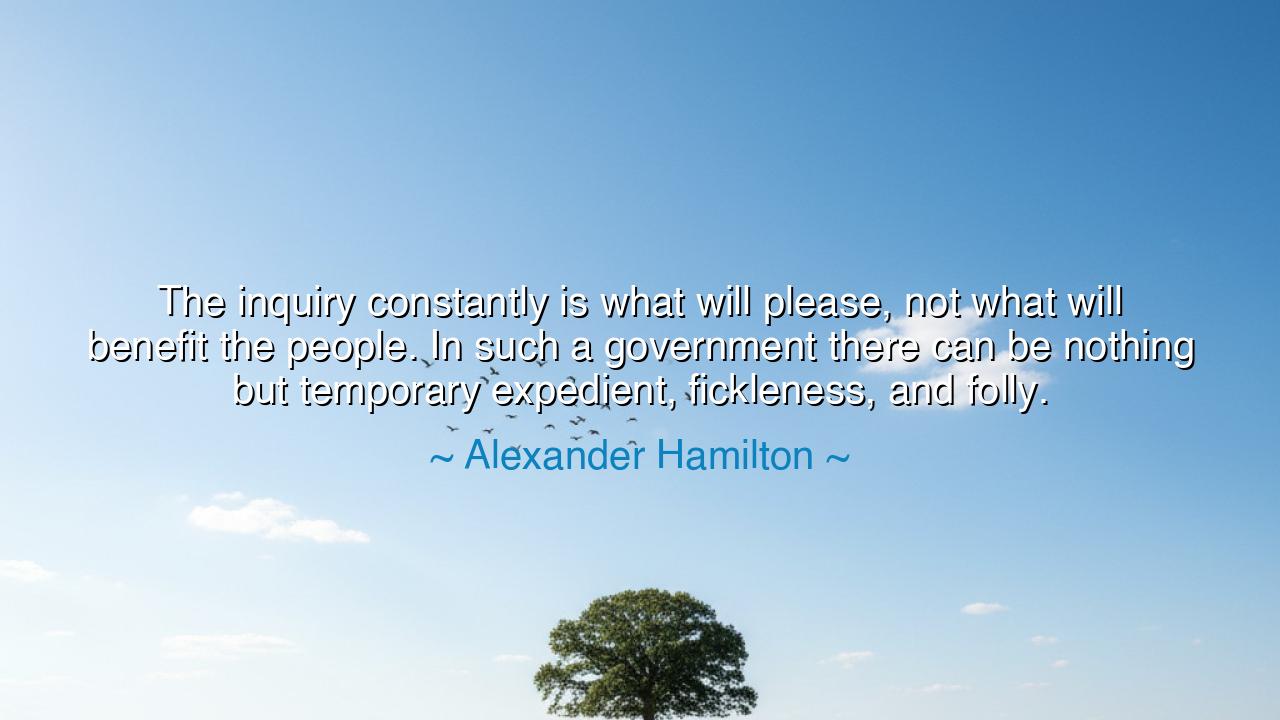
The inquiry constantly is what will please, not what will benefit
The inquiry constantly is what will please, not what will benefit the people. In such a government there can be nothing but temporary expedient, fickleness, and folly.






The words of Alexander Hamilton — “The inquiry constantly is what will please, not what will benefit the people. In such a government there can be nothing but temporary expedient, fickleness, and folly.” — flow like iron through the veins of wisdom. In this sentence, Hamilton warns of a danger more subtle than tyranny and more poisonous than corruption: the decay that comes when rulers seek popularity over principle, and when government pursues applause instead of virtue. His words are not the cry of cynicism, but the lament of a man who saw clearly that a nation’s ruin begins not in fire or rebellion, but in the slow surrender of truth to convenience.
The origin of this quote lies in the infancy of the American Republic, a time when the Founders stood like architects before the foundations of a new world. Hamilton, ever the realist among visionaries, understood that liberty could not survive if government became the servant of passing passions. In the wake of revolution, the people’s voice was sacred — yet he foresaw that this voice could be swayed, manipulated, or weakened by leaders who sought to please rather than to serve. To govern by popularity, he believed, was to build a ship steered by the wind instead of the compass, destined to drift upon the waves of chaos and indecision.
This warning was not born of disdain for democracy, but of reverence for its strength. For Hamilton knew that freedom without discipline becomes an instrument of destruction. The wise ruler, he said, must ask not “What do the people desire today?” but “What will bless them tomorrow?” The heart of good governance is not in yielding to the loudest cry, but in discerning what is right even when it is unpopular. When the inquiry of those in power is directed toward pleasing rather than benefiting, the spirit of the nation weakens — its leaders become actors upon a stage, and its citizens, mere spectators of their own fate.
History offers countless mirrors of this truth. Consider the final days of the Roman Republic, when senators, once noble stewards of the state, sought only to win the favor of the crowds. They fed the people with spectacle — games, feasts, promises — and neglected the crumbling pillars of the empire. Each policy became a temporary expedient, each decision a gesture to maintain applause. In time, the people forgot how to demand virtue, and the rulers forgot how to practice it. Thus, Rome’s liberty dissolved not by the sword, but by fickleness and folly, just as Hamilton forewarned.
The quote also carries within it a lesson for all ages, not only for rulers but for every soul who leads, teaches, or influences others. The temptation to please rather than to guide is universal. Parents who seek to be adored rather than to discipline, teachers who flatter rather than challenge, leaders who promise ease rather than truth — all fall into the same trap. The path of virtue is often steep and narrow, while the road to popularity is wide and fragrant with praise. Yet only one leads to enduring honor.
Hamilton’s words teach that principle must stand above pleasure, and that duty must outweigh desire. To govern — whether a nation, a household, or one’s own heart — requires the courage to act for long-term good, not short-term comfort. The folly of chasing approval is that it gives birth to instability; the one who lives by the praise of others dies by their disappointment. True wisdom demands constancy: a steady hand, a steadfast heart, and the strength to stand firm when the crowd sways like grass in the wind.
Let this teaching, then, be written not merely in books, but upon the hearts of future generations: seek not what will please, but what will benefit. Do not ask, “What will make me loved today?” but rather, “What will make me worthy of love forever?” The greatest leaders — and the greatest souls — are those who do what is right even when it costs them favor, comfort, or acclaim.
So remember Hamilton’s warning: a people who choose charm over character will inherit the rule of fools. And a government that worships applause will one day stand alone before silence. Choose wisdom over popularity, truth over expedience, and steadfastness over folly — for in such choices lies the endurance of all great nations, and the immortality of all great hearts.






AAdministratorAdministrator
Welcome, honored guests. Please leave a comment, we will respond soon